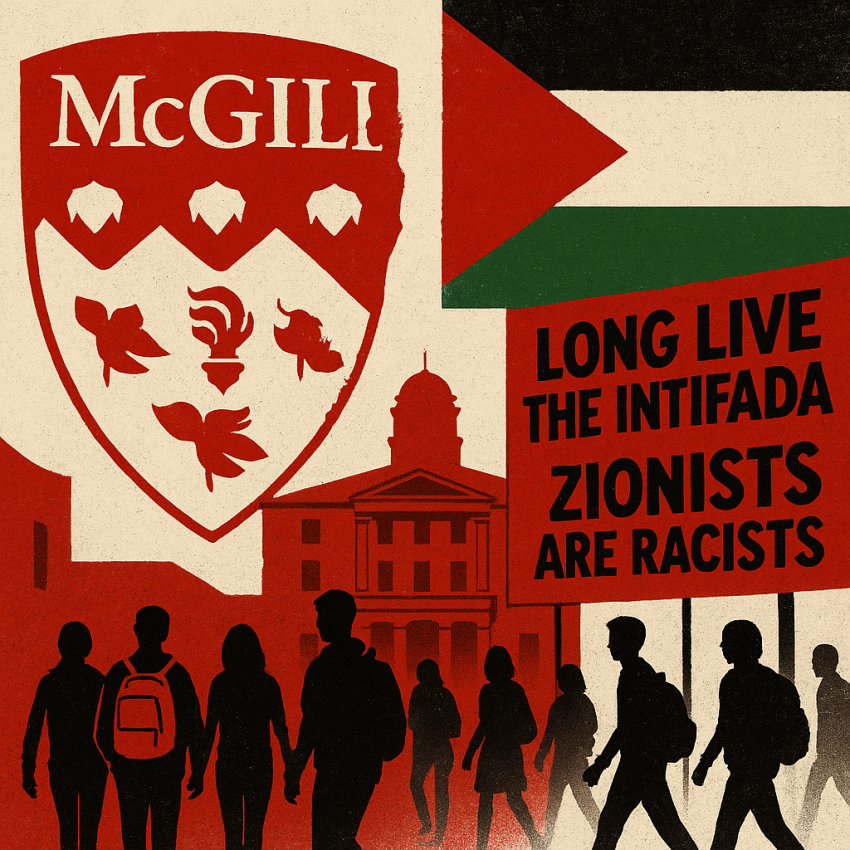Yesterday McGill’s faculty voted to endorse an academic and cultural boycott of Israel just before what many hope will be a moment of relief, the expected release tomorrow of the remaining Israeli hostages held in Gaza. As families prepare to reunite, professors at McGill accused Israel of genocide and apartheid and demanded that McGill withdraw investments tied to its military and sever institutional partnerships with Israeli universities. The vote passed overwhelmingly, with 104 in favour, eight opposed, and two abstentions, meeting the required quorum.
The resolution states that Israel’s actions in Gaza satisfy the definitions of genocide under the UN Genocide Convention and that its system of rule over Palestinians amounts to apartheid. It claims McGill is complicit through its academic, financial, and cultural ties and calls on the university to divest from companies involved in occupation or military infrastructure, to suspend or end collaborations with Israeli institutions, and to formally acknowledge its role in perpetuating injustice. The motion includes a two year sunset clause, meaning it will lapse unless renewed. Proponents emphasize that the boycott is aimed at institutions, not individual scholars, but critics argue the distinction will not spare Jewish and Israeli students or faculty from feeling targeted.
McGill’s administration declined to comment on the resolution, continuing a pattern of silence in the face of campus conflict over Israel. That silence has become part of the university’s response to these issues, leaving Jewish and Israeli students uncertain about their safety and place.
This vote did not spring from nothing. McGill’s complicated history with Jewish students stretches back nearly a century. In 1926, McGill adopted an informal ban on Hebrew students from outside Quebec. In the 1930s and beyond, quotas were put in place in faculties such as medicine, capping Jewish admissions at about ten percent. During that period, administrators worried openly that Jewish enrolment threatened the university’s identity. The quotas remained de facto or formal into the late 1960s.
In the 1930s, hospitals affiliated with Montreal’s medical institutions witnessed antisemitic protests. In 1934, the Days of Shame strike occurred at Hôpital Notre Dame, where interns walked off their posts in protest over a Jewish doctor’s appointment, an episode of open hostility against Jewish professionals in the city. That strike, though not directly university policy, reflected the climate in which McGill and affiliated institutions operated.
Decades later, in 2024, the rhetoric of exclusion took physical form on McGill’s campus. Students erected a pro Palestinian encampment demanding divestment and institutional disavowal of Israel. The encampment grew to about 100 tents. Jewish and Israeli students reported harassment, threats, and a hostile atmosphere. McGill declared the encampment illegal and eventually dismantled it, citing policy violations, safety, and order. In the months it remained, the protest polarized the campus and deepened mistrust.
Yesterday’s resolution echoes the demands that filled banners on the lower field a year ago, divestment, severance, accountability. The difference is that this time those demands come from faculty. What was once student activism now carries the prestige of academic authority.
The timing amplifies its impact. The war that began on October 7, 2023, after Hamas attacked Israel, led to thousands killed and many more wounded or displaced. In that assault, 251 people were taken hostage into Gaza. Tomorrow those hostages are expected to return under a prisoner exchange, bringing families from a year of agony back together. But while the world watches that moment, McGill’s faculty have chosen to formally accuse the state those families belong to of genocide.
This resolution is not a bold act of moral clarity. It is a continuation of a long pattern at McGill, one where academic authority is turned to political censure and where Jewish students and scholars find again that their history at McGill is one of conditional welcome.

